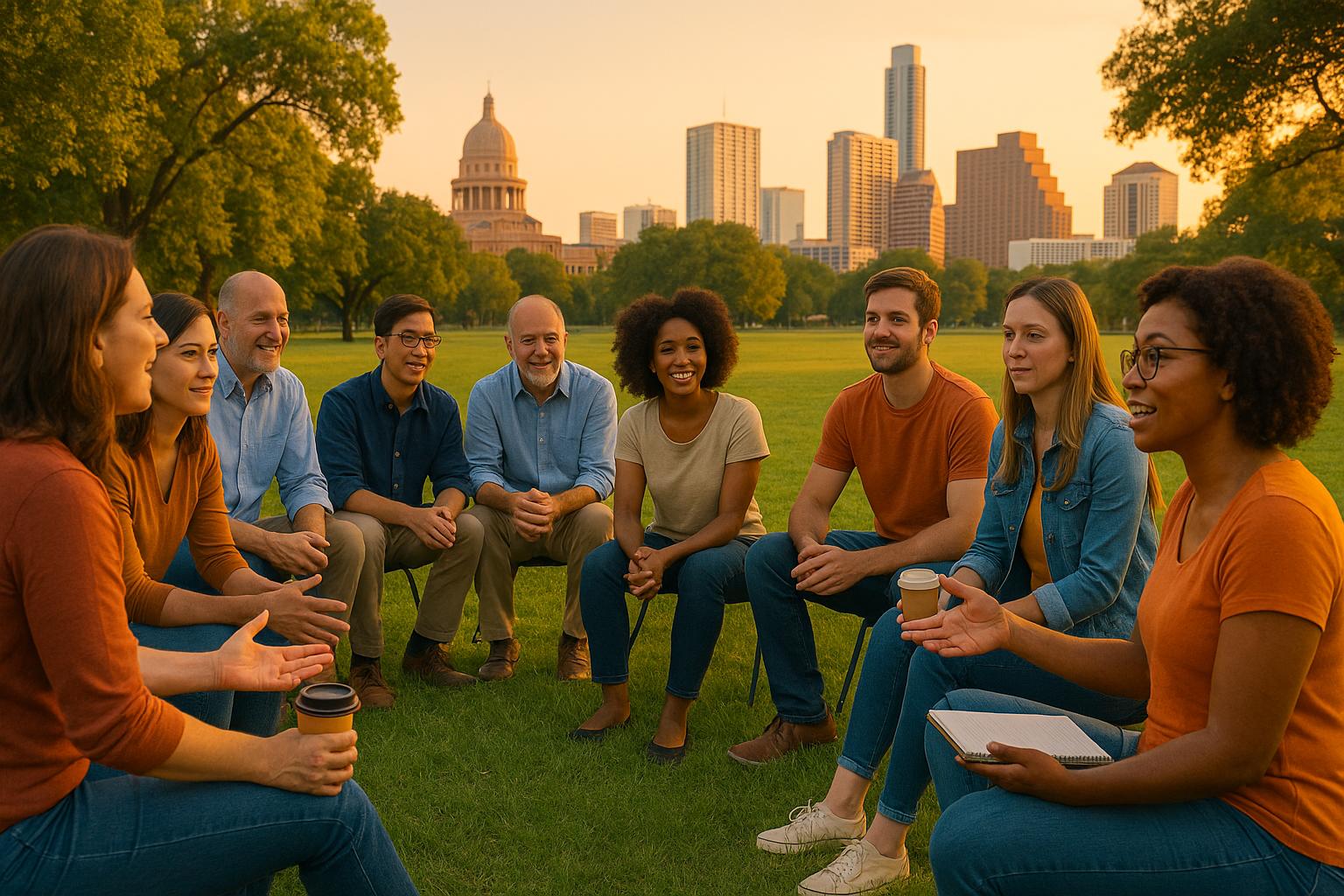Civic engagement helps Austin residents shape their community and influence local decisions. Here’s how you can get involved:
- Attend Local Government Meetings: Share your voice on policies like zoning and urban development.
- Use Online Tools: Provide feedback through community forums and city platforms.
- Join Neighborhood Activities: Participate in events like clean-up days and block parties to strengthen local ties.
- Collaborate with Nonprofits: Volunteer with groups focused on green spaces, education, or affordable housing.
- Build Leadership Skills: Take workshops on public speaking and community planning.
- Connect with Community Groups: Network with local organizations to address shared challenges.
- Stay Updated: Follow platforms like Austin Local Team for news on urban projects and developments.
Taking part in these activities ensures your voice is heard, strengthens community bonds, and helps shape Austin’s future.
Imagine Austin Speaker Series: Taking the Next Step in Civic …
1. Go to Local Government Meetings
Attending local government meetings is a great way to have a say in Austin’s policies. These gatherings cover topics like construction projects, real estate developments, and community events – issues that reflect the city’s fast-paced growth.
Before you go, check the meeting agenda on the City of Austin website. This helps you focus on the topics that matter most to you. Staying updated through local newsletters or trusted Austin news outlets can also give you an edge in understanding ongoing developments. A little preparation goes a long way in making your input more effective.
Planning to speak? Review the public comment rules beforehand and organize your thoughts into clear, concise points.
Being involved not only keeps you informed but also lets you help shape the future of your community.
2. Use Online Tools to Share Your Input
While attending events in person strengthens local connections, online tools give you the opportunity to extend your reach and influence decisions in the Austin community. These platforms allow residents to share their thoughts and help shape local policies.
When providing feedback online, clarity and precision are key. Here’s how to make your input stand out:
- Be specific: Include detailed information and real-world examples to support your points.
- Follow up: Stay engaged after submitting your feedback to track progress or provide additional insights.
- Use reliable sources: Reference credible information to back up your suggestions.
Online spaces also host ongoing discussions about community topics like neighborhood growth and real estate trends. For instance, platforms such as Austin Local Team’s community forum let you stay informed and join conversations that impact local decision-making.
3. Get Involved in Your Neighborhood
Getting involved in your local area helps strengthen community connections and allows you to make a direct difference where you live.
Start with Your Immediate Community
Look for ways to connect with neighbors through bulletin boards, social media platforms, or local events. These interactions can uncover shared concerns and interests, often leading to collaborative efforts. Building these initial relationships can set the stage for larger, organized initiatives.
Organize Community Events
Hosting events in your neighborhood is a great way to bring people together and encourage participation. Consider these ideas:
- Block parties
- Community clean-up days
- Neighborhood yard sales
- Local farmers markets
- Holiday celebrations
Be sure to check local rules and permits, and plan events around existing community schedules. Over time, these gatherings can grow into regular efforts that benefit everyone.
Create Long-Term Change
Turn one-time events into lasting projects by:
- Documenting outcomes with photos and feedback
- Using the success of events to inspire larger initiatives
- Staying connected through email lists or social media groups
- Keeping track of neighborhood improvements
Start small and focus on specific local needs. Building strong relationships with your neighbors can lead to bigger opportunities for collaboration on meaningful projects. Tools like Austin Local Team’s updates can help you stay informed about activities and ways to get involved.
4. Work with Local Groups and Nonprofits
Collaborating with local organizations is a great way to make a difference while connecting with others in your community. Austin is home to many nonprofits and community groups that offer opportunities to contribute meaningfully. Here are a few areas where your efforts can leave a lasting impact.
Green Spaces and Environmental Projects
Join efforts to keep Austin’s natural areas thriving. The Austin Parks Foundation hosts events like "It’s My Park Day," where residents come together to enhance local parks. Similarly, Keep Austin Beautiful organizes cleanups and educational programs focused on preserving the environment, such as initiatives to protect Lady Bird Lake.
Supporting Education
Help improve local education by working with organizations that connect volunteers to schools. Austin Partners in Education facilitates classroom coaching and mentorship programs, while Communities in Schools of Central Texas provides mentoring and extra support for students who need it most.
Affordable Housing and Community Growth
Get involved in housing projects that make a real difference. Habitat for Humanity of Austin runs initiatives to build affordable homes, allowing volunteers to play a hands-on role in improving the community. Foundation Communities also welcomes volunteers to assist with housing projects and community-strengthening programs.
How to Get Started
Before jumping in, consider these steps:
- Learn about the organization’s goals and community impact
- Attend an orientation to understand their volunteer process
- Start with a one-time event to see if it’s a good fit
- Check your schedule to ensure you can commit long-term
Some organizations may require background checks and training, so plan ahead. Many groups share their volunteer calendars well in advance, making it easier to align your availability with their needs.
sbb-itb-4c99469
5. Learn Community Leadership Skills
Leadership skills are key to making a difference in your community. In Austin, you’ll find training programs and workshops that focus on areas like strategic community planning, public speaking, coalition building, project management, and conflict resolution. These sessions expand on the community involvement techniques mentioned earlier.
Local organizations and agencies host hands-on workshops and offer mentorship opportunities. Topics often include running effective meetings, driving neighborhood improvements, and understanding city policies. These programs give practical advice on civic engagement and advocacy.
Be sure to check details like dates, registration requirements, and fees directly with the host. Pairing formal training with volunteer work in your local area is a great way to build a strong set of leadership skills.
6. Connect with Different Community Groups
Expanding your local connections and applying leadership skills can help you make a bigger difference in your community. By engaging with various groups, you can address shared challenges and work toward practical solutions.
Look for groups that align with your interests. For example, connect with experts who understand local issues and can provide valuable perspectives. Stay updated by following local news, newsletters, and media to spot initiatives tackling community concerns.
Keep in mind that trust isn’t built overnight. Take the time to listen to each group’s concerns and priorities to create meaningful and collaborative relationships.
7. Track Local Updates with Austin Local Team
Keeping up with local developments is key to staying engaged in your community. The Austin Local Team offers insights into real estate trends and urban projects that shape the future of the city. Their updates are a great addition to other tools that help you stay informed about civic matters.
For example, they recently highlighted a "$150 Million Downtown Skyline Transformation" project, sharing crucial details about permits and timelines, with changes expected to continue through 2026. These updates not only keep you informed but also make it easier to take action in your community.
Here’s what their platform provides:
- Detailed reports on local construction and development projects
- Regular updates through their newsletter
- A connection to over 150,000 locals via their Austin Texas Things brand
"As your knowledgeable guides to the Austin housing market and the city’s vibrant culture, we keep you informed on all things Austin. Sign up for our newsletter to stay connected."
– Austin Local Team
Conclusion
Civic engagement goes beyond being a duty – it’s a chance to actively shape Austin’s future and improve the quality of life for everyone in the community. The strategies discussed in this guide provide various ways for residents to contribute to Austin’s growth and development. These approaches emphasize the importance of your voice in influencing the city’s direction.
Recent large-scale projects in Austin have shown how community involvement can directly impact the city’s progress, proving the real-world effects of active participation.
Why Civic Engagement Matters:
- Better Decisions: Staying updated on local news and development plans allows you to make informed choices about housing, community projects, and neighborhood changes.
- Stronger Communities: Attending local government meetings or joining neighborhood groups ensures that the needs of residents are considered in development plans.
- Valuable Connections: Participating in community activities helps build relationships that strengthen Austin’s social network and encourage teamwork.
Austin’s future relies on people taking an active role in its development. Whether your interests lie in urban planning, healthcare, or local initiatives, there are plenty of ways to get involved.
Civic engagement is an ongoing process. Use local resources and tools to stay informed and make a difference. As Austin continues to grow, your participation will play a key role in shaping its future.
FAQs
Where can I find information about local government meetings in Austin?
To stay informed about local government meetings in Austin, you can check the official City of Austin website. They regularly post schedules, agendas, and locations for city council meetings, public hearings, and other civic events. You can also subscribe to their email notifications or follow their social media channels for updates. Participating in these meetings is a great way to stay engaged and contribute to your community.
How can I effectively share feedback on online community platforms to make a positive impact?
To provide impactful feedback on online community platforms, focus on being constructive, respectful, and specific. Clearly explain your thoughts, offer actionable suggestions, and avoid overly critical or vague comments. For example, instead of saying, ‘This doesn’t work,’ try, ‘I noticed this feature could be improved by adding XYZ for better usability.’
Engage positively by acknowledging good points before addressing areas for improvement. This approach fosters collaboration and encourages others to value your input. Lastly, tailor your feedback to the platform’s guidelines and community norms, ensuring your message resonates with the audience and aligns with the platform’s purpose.
How can I find local nonprofits or community groups in Austin that match my interests and skills for volunteering?
To find local nonprofits or community groups in Austin that align with your interests and skills, start by identifying the causes you’re passionate about, such as education, environmental conservation, or housing. Once you’ve narrowed down your focus, explore platforms like community bulletin boards, local social media groups, or city websites that list volunteer opportunities.
You can also attend local events, such as neighborhood meetings or charity fundraisers, to connect with organizations directly. Many nonprofits are eager for volunteers with specific skills like marketing, event planning, or teaching, so don’t hesitate to reach out and ask how you can contribute. Volunteering is a great way to make a meaningful impact while building connections in your community.






